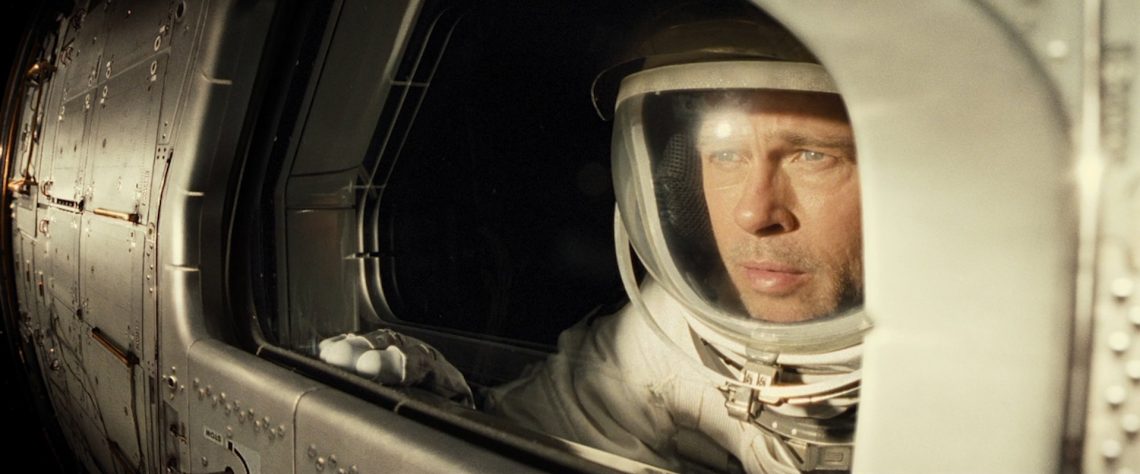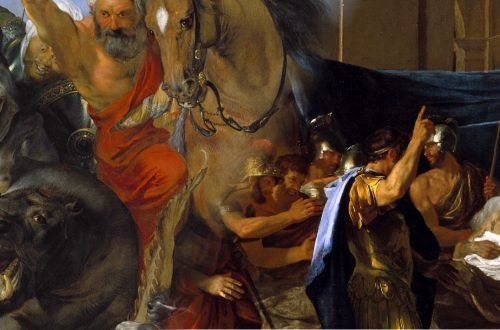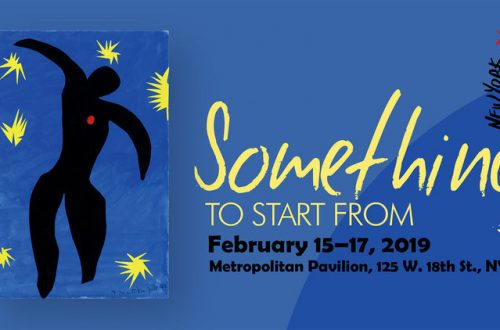by Andrew Carr
I wondered whether the stillness on the face of the immensity looking at us two were meant as an appeal or as a menace. What were we who had strayed in here? Could we handle that dumb thing, or would it handle us? I felt how big, how confoundedly big, was that thing that couldn’t talk, and perhaps was deaf as well.
Joseph Conrad, Heart of Darkness
I first saw James Grey’s Ad Astra at the Mall of America, back in September of last year. My friends and I had a drink at the bar beforehand, and afterwards discussed our initial impressions as the roller coasters at Nickelodeon Universe roared in the background. Recently, one of those same friends told me that the mall has reopened in some capacity. The world, of course, has changed dramatically in the meantime. And some of the themes which then seemed most essential to the film have faded into the periphery, while others, hardly registered at the time, have shifted towards the center of my focus. Though I’m often unable to articulate precisely how the global pandemic, or the killing of George Floyd have impacted my thinking—those impacts are undeniably in evidence when I contemplate a work of art, a film, a book. I find myself bringing new questions to these things, and it is in their mirror that I have been observing changes in myself.
It would be shamelessly opportunistic to try and pass off Ad Astra as in some way about COVID-19 or Black Lives Matter. Yet it also seems somehow irresponsible to talk about a movie as if the world hasn’t been transformed around us. I felt a similar set of tensions teaching my final class of the school year over Zoom on May 29th. The third precinct had burned the night before, and I could not in good conscience teach my Scripture course as if nothing was happening in our city. But neither could I neglect the passage in John’s gospel that I’d asked them to read the night before. What I found, however, as we worked through that half an hour together, was that those two imperatives weren’t opposed, but fundamentally linked. Life necessarily invades our intellectual, academic, and religious pursuits. And those pursuits find their fulfillment in how they dialogue with our present needs. Learning, uninformed by upheaval, personal or social, loses all vitality. At the end of that Zoom call I found myself recommitted to the work I’ve always valued, but I returned to it changed, with new insights, new desires, and new responsibilities.
And indeed as I’ve spent more time with this movie, it has to some extent helped me recognize a commonality between these two crises, between the ongoing history of racist police violence in this country, and an ongoing global pandemic—and that is the seeming inhumanity of their scale. Albert Camus expresses this quality perfectly in a passage from his novel The Plague:
Everybody knows that pestilences have a way of recurring in the world; yet somehow we find it hard to believe in ones that crash down on our heads from a blue sky… In this respect our townsfolk were like everybody else, wrapped up in themselves; in other words they were humanists: they disbelieved in pestilences. A pestilence isn’t a thing made to man’s measure: therefore we tell ourselves that pestilence is a mere bogy of the mind, a bad dream that will pass away.
Camus’ words provide a powerful insight into both the pestilence of COVID-19, and the pestilence of institutional racism. We long to discount what we cannot compass. Pestilence is left unchecked when human imagination fails to engage with problems that extend far beyond the horizons of individual experience. And if Camus is right, then the crucial and pressing question is how exactly to acknowledge and grapple with what is not “made to man’s measure.”
—
Ad Astra might be taken as an encounter with the immense, an ongoing struggle to understand what agency looks like in the face of impassive expanses. The movie is imbued with a sense of existence within incalculable systems. In an early scene astronaut Roy McBride (Brad Pitt) sits at the end of an enormous conference table, in an imposing meeting room, as he’s briefed by a handful of high ranking officials. Personnel monitor him on devices from across the room. This is the first sort of immensity we move through: of governmental and bureaucratic structure. Its workings are opaque and its motives suspect. It has human faces, but they do not indicate or encourage real connection. You never quite forget, as these officials speak, that they aren’t just speaking for themselves, that their words aren’t their own.
It’s a dynamic that Roy seems versed in. While he listens, his face wears the same expression as on the movie’s poster: some compelling mixture of competence, patience, and weariness. The face of accomplishment without satisfaction. Of fortitude without conviction. Roy is disillusioned—in a way that only the truly ascendant can be disillusioned. Praised for his uncanny ability to maintain a slow heart rate under extreme stress, Roy has made something of an impression. But he has advanced far enough within this huge enterprise of space exploration to be convinced of its absurdity, to doubt its humanity.
Even here in the briefing, however, another, deeper type of immensity is already gestured towards. A series of electrical storms have, to use Camus’ phrase, crashed down on our heads from a blue sky. These surges have been traced back to Neptune’s orbit, the last known location of Roy’s father, Clifford McBride (Tommy Lee Jones). Clifford was the pioneer of space exploration, a titan in the field, who disappeared some 16 years ago on an ambitious mission to discover extraterrestrial life. Roy’s commission is to attempt contact. The authorities have been sending out their own messages, but without success. They’re hoping that Clifford, if he’s really still out there somewhere, will be moved to respond to the voice of his own son. In essence they’re asking him to utilize his personal relationship for their interests.
The assignment’s unspoken irony is that Roy hardly knows his father—at least not as a father. In interviews director James Gray has said that part of his initial vision for Ad Astra was to explore Homer’s Odyssey from the point of view of Odysseus’s son Telemachus, who grows up in Ithaca, awaiting his father’s return from Troy. For anyone who’s looking, there are plenty of subtle parallels between the stories—but it’s a unique familial estrangement that Ad Astra takes as its emotional center.
Like the young Telemachus, Roy admires his father and seems to genuinely lament his absence. Compared to the current, uninspired state of space exploration, Clifford’s legacy maintains a degree of allure. Roy continues to venerate his father, to picture in his legacy a more vital image of discovery. “My dad was the program,” says Roy, at once expressing admiration, and admitting the extent to which this towering figure is in fact indistinguishable from the program itself. Roy’s admiration remains impersonal. He admires his father as one might admire the name of Christopher Columbus, or a founding father. And in this too his perspective distinctly echoes Telemachus, and his early words about his own father:
My mother says I am his son; I know not
surely. Who has known his own engendering?
I wish at least I had some happy man
as father, growing old in his own house—
but unknown death and silence are the fate
of him that, since you ask, they call my father.
Trans. Richard Latimore
So many shades of meaning color that final line. So much is said in that final “they.” It’s the impersonal language of a son who has pieced together an image of his father from second hand accounts. We see Roy performing a similar sort of assembly, rewatching old video calls from his father, scanning his words and expressions for a sense of the man. Roy is seeking out his antecedents, trying to situate himself in the world, trying to understand what’s inside of him. Trying, in a sense, to find some personal guide to help him navigate the vast, disorienting enterprise he finds himself inside. Ultimately, Roy’s willingness to play the game and pursue the mission, comes from this recognition: that the personal has become inextricably entwined with the immense. There is no other way to be human than to engage with this confoundedly big thing.
And Roy adopts the necessary indifference. “I am ready to go,” he says in a psych evaluation before setting out on his mission. “Ready to do my job to the best of my abilities. I am focused only on the essentials, to the exclusion of all else. I will make only pragmatic decisions. I will not allow myself to be distracted. I will not allow my mind to linger on that which is unimportant.” He says it with conviction.
—
Roy’s message will be sent from a station on Mars, and he departs from earth in accommodations not too terribly removed from a first class airline seat: charming stewardesses and moist towelettes. In this near future, space travel has been commercialized—the moon refashioned into something aesthetically reminiscent of a shopping mall. There’s little sense of any meaningful progress. “All the hopes we ever had for space travel,” Roy muses, “covered up by drink stands and T-shirt vendors, just a recreation of what we’re running from on earth.”
As Roy continues further out, however, the rougher edges of space colonization begin to show. Bureaucratic structures take on a surreal sense of impotence. Mineral rights are in dispute, sections of the lunar surface unsafe to travel without armed guards. On Mars arrivals are monitored by the uneven eyes of a haggard customs official, with a sign behind her desk announcing some sort of suicide hotline. Grey has said that he wanted to create “the most realistic depiction of space travel that’s been put in a movie,” and while the zero gravity, space suits, and rovers are certainly impressive, it’s these mundane, almost shabby settings and procedures that make the whole thing seem not only possible, but familiar. A sense of progress without progress.
In these episodes the influence of Ad Astra’s other major literary touchstone, Joseph Conrad’s Heart of Darkness, becomes increasingly apparent. Conrad’s classic novel follows the journey of Charles Marlow, as he moves up the Congo River in a derelict steamboat. Like Roy, Marlow is moving about the fringes of an empire. The mechanisms of power and authority he witnesses are organized around greed, around the extraction of wealth—if they’re organized at all. More often these dilapidated imperial outposts are characterized by a supreme incompetence, indolence, and cruelty. Stuck for a time at an ivory trading camp on his voyage upriver, Marlow reluctantly takes a look around him:
I saw this station, these men strolling aimlessly about… I asked myself sometimes what it all meant… I’ve never seen anything so unreal in my life. And outside, the silent wilderness surrounding this cleared speck… struck me as something great and invincible, like evil or truth, waiting patiently for the passing away of this fantastic invasion.
Marlow’s words might just as easily serve for Roy’s internal monologue as he moves outward into the vacuum of space. Both the milieu that Roy travels through, and his own mission share this same sense of fantastic futility. The scenes are “unreal” in that they are built upon absurdity, in that they defy human comprehension—but also because of the immense backdrop against which they eke out their existence. Just beyond this “cleared speck” exists an even larger, more profound unreality, without respect or even interest in the perspective of human beings. Increasingly, earth’s sprawling invasion dwindles and diminishes in the face of the deep space around it. And confronted by such growing emptiness, Roy’s collected, professional posture becomes increasingly strained.
In perhaps the film’s most eerie and arresting image, Roy, stopping to follow up on a mayday signal, makes his way to the outer airlock of a stranded vessel and looks in. As he approaches the opening—from which we look out at him—the darkness inside the ship, reflected upon his golden visor, slowly grows in size until his whole helmet is one fathomless black pupil.
But it’s not until he’s given a chance to send a message to his father that Roy’s composure really slips. After transmitting several government approved, boilerplate communications and receiving no response, Roy breaks script and reaches out to his father with a genuine appeal. It evokes a reply, though Roy isn’t allowed to hear it. By the time he leaves the room his heart rate is racing, and he’s promptly removed from assignment as emotionally compromised. Escorted to a nearby terminal, he fails his psychological evaluation and is detained indefinitely. The station on Mars resembles nothing so much as a concrete bunker or prison, and certain small rooms have been set aside with the goal of alleviating the pressures of isolation. These “comfort rooms” use four-wall, floor-to-ceiling projections to simulate organic environments in an attempt to soothe the pervasive atmosphere of alienation. It is to one of these rooms that Roy is quarantined. There he struggles to regain control over himself, to reassert some semblance of balance—while a giant bee enters an enormous flower, while a dizzying flock of birds takes off into an unconvincing sky, while distant slate colored waves topple forever in silent slow motion.
There’s a moment in Heart of Darkness when Marlow, beginning to feel the pressures of his own voyage, recalls a doctor who, while measuring Marlow’s skull, had expressed a desire to watch in real time the changes wrought by such trying expeditions. In the midst of the jungle, Marlow admits that he felt he was “becoming scientifically interesting.” And though he may not admit it, Roy too is becoming interesting: as the veneer cracks something troubled and human appears. As the professional assignment dissolves, a personal necessity takes control. A parallel path is revealed: the journey outward into the darkness is mirrored by a journey inward, into a corresponding obscurity.
Strangely, as Roy’s course continues into immeasurable distance, the rooms tighten, movement constricts. Vastness, paradoxically, compresses. We shrink within it. When the environment provides no place to rest, we burrow within ourselves. Think of kids in a cafeteria, making a small, enclosed circle at the end of the table, like a smaller room inside the larger one. Or the manageable boundary that a campfire carves out in the middle of a dark forest. As he drifts towards Neptune, and space empties itself of any meaningful stimulus, Roy’s memories, his desires and his regrets materialize into a landscape of their own. They take on new clarity and import. And this turns out to be one of Ad Astra’s most compelling insights: that the abyss, far from proving the insignificance of human meaning—instead somehow intensifies it. Isolation, far from stagnating, has the capacity to galvanize. Utterly unmoored, drifting into the impersonal deep, it’s the human perspective which emerges as indispensable. Roy’s mind returns again and again to the earth. The brutal immensity manages to reveal how unspeakably precious that infinitesimal point, with its supposedly inconsequential concerns, turns out to be. The mercilessly large calls forth compassion. Inhumanity amplifies humanity, shows its worth, lays bare the imperative. Across such a terrible distance the earth somehow continues to exert its pull. And in the end, the question for Roy, as he pauses like a projectile at the height of its trajectory, is how to get back home.

Andrew Carr is a writer, painter, and teacher from St. Paul, MN. He loves cinema, short stories, and Saturday night jazz. He creates in the hope that his work might be as natural “As the cackle of toucans/ In the place of toucans.” You can find more of his drawing and painting at andrewgrumcarr.com.
Header Image: Still from the film Ad Astra, used in accordance with fair use.





